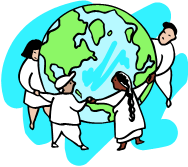We are Ready Now for a Higher, Deeper Level of Assimilation
— Results of the Three Immigrant Dialogues Sponsored by the MHNO and Living With Peace in May and June, 2009
By Christina Feller / copyright © Christina Feller August 2009
“We are crowded, maybe thirty to a room, with a waiting list for a year at Adult Education. While we are grateful for the chance to learn English, we must have more one-on-one teaching and coaching opportunities. We are not teen-agers. What is lacking is a range of really good cultural brokers who understand what we need and how we arrange for these necessities within our own cultures and to respect our cultures as you provide these services to us.” So, began Dialogue #3 on June 28th at the East End Community School on Munjoy Hill.
We began with a review of the dominant statements from the first two dialogues. “Africa is who we are and we cannot be separated from that reality,” said a young adult girl from Burundi. “Our culture is our property. It is not like a house that can be bought or sold, that can be passed around or renovated,” said a gentleman from Sudan.
“When you ask us to give you our culture and replace it with yours, so that we can live here successfully, you end up taking our culture from us, said a man from Sudan. Because our culture is our property, it is as if you are robbing us of our property. You see the irony I hope—because to us this acculturation process can quickly become perceived as a violent one. Our culture is all we have. And we have suffered hundreds of years of persecution by people telling us how to live. Then, because of our culture, we have been massacred, tortured, finally complete holocaust—the genocides of eastern Congo and Rwanda and Burundi. The killing in Darfur goes on till today. The killing in Mogadishu is going on now. Our separate and unique cultures are being annihilated at home—please do not ask us to become American according to your schedule. We must do it on our own individual schedule. You need to know that.”
Eric Nkusi added, “The fact is that more than 70% of the immigrants from Africa have suffered torture themselves or have witnessed it. You can actually ask someone here in Portland if they have witnessed a lion or a soldier or rebel kill their parent and you can get a yes answer.”
Another woman from Rwanda said to me quietly, “You may wonder why more women who were farmers in Africa do not come out and take advantage of a farming opportunity now when you go to the trouble of arranging for it. They may not tell you that they cannot any longer bend over, or bend down, or even stand for any period of time because of the aftermath of their injuries suffered in the genocide. They are embarrassed. They feel bad. They have horrible memories to overcome every day.”
But this is a cultural “gap”, explained another man from Somalia for not asking beforehand which people are good candidates before you get the grant money, or better yet, not arranging for special equipment or needs for people injured in the genocide to take advantage of the opportunity in a specialized way.
The general consensus from participants was that service brokers and officials of programs meant to bridge the cultural gaps were not always successful because of a lack of quality or competence in understanding immigrant ways, customs, language and special needs because of the torture. “Look,” said one participant, “I moved to Egypt from a Camp in Lebanon and you would think that Arabic is Arabic, but not so. It took me four months to learn how to answer the telephone correctly! Translators should not be used. People need to be able to speak for themselves. There have been major misunderstandings because of inaccuracies in translation exacerbated by tribal conflict that the service provider may be unaware of. We want to, we must learn English ourselves, but we have to do it in a way that is relevant to our individual situations.”
We had a discussion about the word Dialogue. To one man from Juba in Southern Sudan , it was an opportunity to listen and learn only, not to judge, opine, or comment. To understand why tribal law (we are not talking religious mandate) allows and regulates having multiple wives, we need to listen with an inquiring mind. And, frankly speaking, as a Harvard-educated woman and sociologist, it made absolute perfect sense to me as he explained the inter-generational obligations of the marriage contract and dowry requirements on the stability and cohesion of the tribes involved!
At the conclusion of the third dialogue, we were thrilled to welcome Lydia Bakunda from Burundi and Letitia Runyambo from DR Congo who sang an original song written by Lydia called Hope. The girls are forming a singing group and we wish them good luck.
We are now forming additional dates and time to continue these dialogues. We want to include as many people as possible. We will continue to report our findings in these pages. If you are interested in participating, please contact Living With Peace Vice President Roger Ruganzu at rruganzu@yahoo.fr or dialogue facilitator Christina Feller at cfeller@maine.rr.com.
Subscribe to:
Post Comments (Atom)

No comments:
Post a Comment